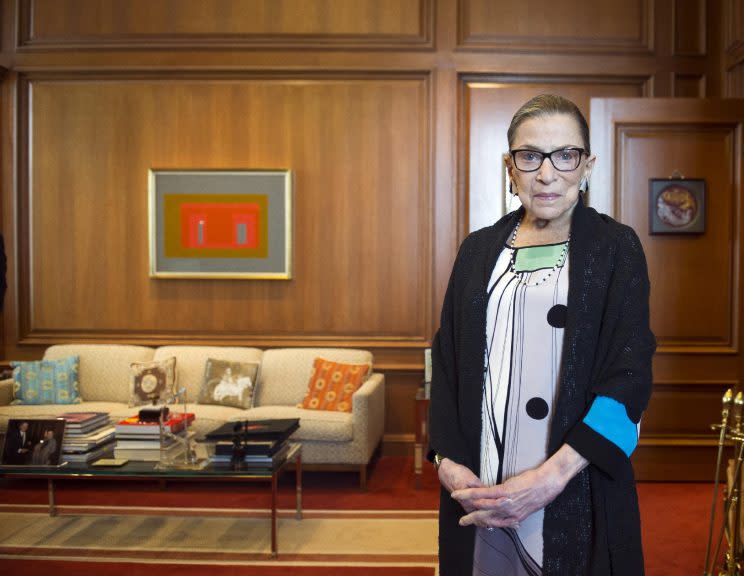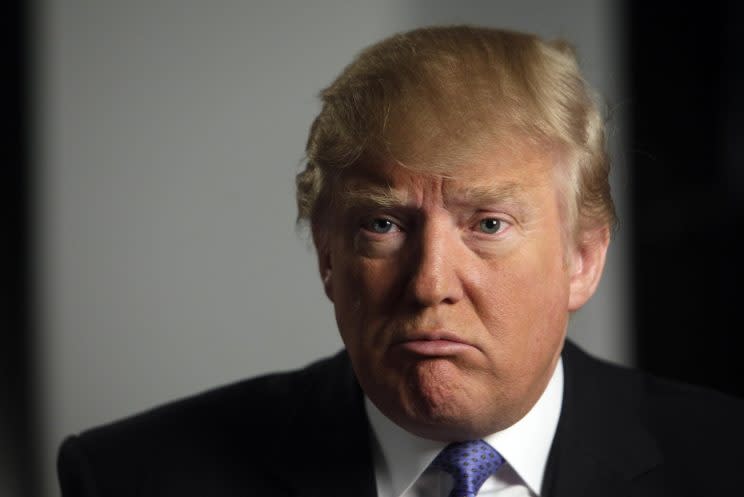NYT, WaPo criticize Justice Ginsburg’s Trump comments
The editorial boards for both the New York Times and the Washington Post took issue with Justice Ruth Bader Ginsburg’s recent musings about presumptive Republican presidential candidate Donald Trump.
Each paper editorialized this week that Supreme Court justices should hold back from broadcasting their preferences in the presidential race because it could bring their impartiality into question.
Neither the Times nor the Post challenged Ginsburg’s assessment of Trump as egotistical, inconsistent and unqualified for the Oval Office. Nevertheless, her comments would have been better left unspoken, according to the newspapers.
“As journalists, we generally favor more openness and disclosure from public figures rather than less,” the Post wrote on Tuesday. “Yet Justice Ginsburg’s off-the-cuff remarks about the campaign fall into that limited category of candor that we can’t admire, because it’s inconsistent with her function in our democratic system.”
On Wednesday, the Times characterized Ginsburg’s comments as “political punditry” and “name-calling.”
“There is no legal requirement that Supreme Court justices refrain from commenting on a presidential campaign. But Justice Ginsburg’s comments show why their tradition has been to keep silent,” the paper opined.
Both papers invoked the Supreme Court’s role in resolving the contested 2000 presidential election between Republican George W. Bush and Democrat Al Gore. At the time, many liberals criticized the decision, which was backed by five conservative justices, as partisan.

“Think of how that situation would have played out,” the Post suggested, “if one or more of the justices had previously mused about leaving for New Zealand in the event of a victory for either Mr. Bush or his opponent, Democrat Al Gore.”
Similarly, the Times wrote, “And just imagine if this were 2000 and the resolution of the election depended on a Supreme Court decision. Could anyone now argue with a straight face that Justice Ginsburg’s only guide would be the law?”
Ginsburg sparked the controversy with a pair of Friday interviews with the Times and the Associated Press. She said presumptive Democratic presidential nominee Hillary Clinton would likely win the November election and said she did not want to entertain the possibility of a President Trump.
“I don’t want to think about that possibility, but if it should be, then everything is up for grabs,” she told the AP.

Two days later, the Times published its Ginsburg interview, in which she offered even more pointed criticism. The left-leaning jurist said she couldn’t imagine what the United States would become with Trump as the president and joked that her husband, if he were still alive, might have suggested moving to New Zealand.
She also pointed out that the next president is likely to have a significant impact on the court. In addition to the seat left vacant by the death of Justice Antonin Scalia in February, Ginsburg and other justices are reaching ages at which they might retire
Ginsburg further called Trump a “faker” during a Monday interview with CNN: “He has no consistency about him. He says whatever comes into his head at the moment. He really has an ego.”’
Early Wednesday morning, Trump took to Twitter and called for Ginsburg’s resignation.
Justice Ginsburg of the U.S. Supreme Court has embarrassed all by making very dumb political statements about me. Her mind is shot – resign!
— Donald J. Trump (@realDonaldTrump) July 13, 2016
Trump’s critics saw the tweet as out of line but more or less consistent with what they consider his larger disrespect for the judiciary. For instance, just last month, Trump drew widespread condemnation for saying that the U.S. District Court judge overseeing a Trump University case, U.S.-born Gonzalo Curiel, could not be impartial because of his Mexican heritage.
The Code of Conduct for United States Judges, which includes the ethical canons for federal judges, states that judges should not “publicly endorse or oppose a candidate for public office.”
Senate Majority Leader Mitch McConnell, R-Ky., said it was “totally inappropriate” for a member of the Supreme Court to weigh in on a U.S. election.
“It raises the level of skepticism that the American people have from time to time about just how objective this Supreme Court is,” McConnell said Tuesday.
But MSNBC liberal pundit Lawrence O’Donnell argued that Ginsburg did not cross the line by weighing in on the presidential race. He pointed out on his show, “The Last Word,” that three Supreme Court justices actually ran for president: Justice John McLean ran for the Republican nomination in 1856, Chief Justice Salmon Chase ran for the Democratic nomination in 1868 and 1872 and Justice Stephen Field ran for the Democratic nomination in both 1880 and 1884. Their primary campaigns were all unsuccessful.
Though the justices’ White House bids may show that there was not as strong of a separation between the Supreme Court and political campaigns in the 19th century, the high court has had a more impartial tradition in recent decades.
Lyle Denniston, the constitutional literacy adviser for the National Constitution Center, said that nothing in the Constitution’s guarantees of free speech prevents Supreme Court justices from political commentary. He said their First Amendment rights might only be restricted if they say something that reveals their bias in deciding a lawsuit.
“But, whatever the ethical rules provide, most judges feel restrained about saying things that might suggest that they are trying to influence how voters react to politics or to candidates,” Denniston wrote on the National Constitution Center’s website. “This is not merely a matter of ‘political correctness.’ It has more to do with public sentiments about how judges and Justices should do their jobs while staying above the fevered turmoil of politics as it is sometimes practiced in America.”
When asked about Ginsburg’s controversial comments Wednesday, White House press secretary Josh Earnest said, “She didn’t earn the nickname ‘the Notorious RBG’ for nothing,” referencing her popular Notorious B.I.G.-inspired nickname.


